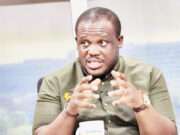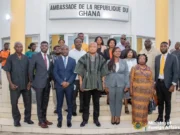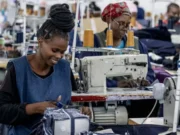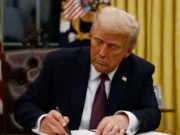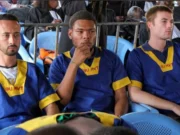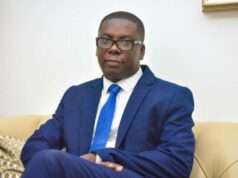Ghana’s former President Nana Addo Dankwa Akufo-Addo has called on African leaders to renew their commitment to constitutional rule and multiparty democracy.
He warned against the reappearance of military takeovers on the continent, expressing grave concern over the return of military coups in West Africa after the sub-region had reached consensus on multi-party democracy as the best governance model.
Speaking at the launch of the long-awaited autobiography of former Nigerian Head of State, General Ibrahim Babangida, ‘A Journey in Service, in Abuja, Nigeria,’ former President Akufo-Addo praised the former Nigerian leader for his candid reflections on governance, military rule, and the complexities of leadership.
General Babangida was a Nigerian Military ruler who later transited into democratic governance.
The book launch, attended by some of West Africa’s most influential political figures, including President Bola Ahmed Tinubu, General Yakubu Gowon, President Olusegun Obasanjo, and President Muhammadu Buhari, underscored the importance of historical documentation in shaping future governance.
In a candid critique of military regimes, he observed that while some still defend the merits of military government, the true cost of such regimes is far higher in terms of resources spent on security and the perpetual threat of instability.
Former President Akufo-Addo recalled his own experiences living through years of coup d’états and military rule in West Africa, acknowledging that such turbulent times left an indelible mark on the collective psyche of the continent.
“A military government, indeed, spends even more energy and resources on security considerations than an elected, democratic one.
“I feel a deep sense of disappointment that military coup d’états have come back in fashion in our region. We have our work cut out for us all over again to try to build and consolidate the democratic structures in our countries,” he bemoaned.
According to him, despite the perceived efficiency of military rule in some instances, history has shown that elected governments provide greater long-term stability and economic progress.
Bridging history and the future
The launch of General Ibrahim Babangida’s autobiography provided a timely backdrop for Mr. Akufo-Addo’s discourse.
He saluted past Nigerian leaders for their roles in securing stability and democratic development in Nigeria, a nation he described as an exemplar of development in freedom.
Mr. Akufo-Addo lauded General Babangida for offering a fascinating, first-hand account of a critical period in Nigerian history, one that serves as both history and folklore for younger generations.

He recalled his personal admiration for the unarmed, young Colonel Babangida as he courageously approached coup-maker Lt-Col Dimka at Radio House in Ikoyi to dissuade him from a doomed venture, a moment that, for Mr. Akufo-Addo, encapsulated the spirit of determination and unconventional leadership.
In a lengthy and candid reflection, he quoted Babangida’s assertion that “there exists a world of difference between engineering a nation and ruling it. I never wished to rule Nigeria, and I never did it. My goal was to engineer it.”
Former President Akufo-Addo explained that this philosophy underscores the importance of charting a new course for a nation—one that harnesses human, material, and moral resources while redirecting and refocusing the nation’s collective psychology towards a future that can be understood, mastered, and managed.
Common struggles
Drawing parallels between Babangida’s tenure from 1985 to 1992 and his own presidency from 2017 to 2025, Mr. Akufo-Addo underscored the common struggles African leaders face, particularly in economic management.
“The reality was a daily grind of trying to keep a country united and together, fighting off coup d’états, and violent disagreements about economic policies,” he remarked.
Mr. Akufo-Addo acknowledged General Babangida’s handling of difficult economic conditions, including the IMF’s Structural Adjustment Programme.
Africa’s self-reliance
Former President Akufo-Addo challenged African countries to forge stronger bonds of cooperation and self-reliance instead of counting on international aid.
According to him, “there is no such thing as charity in international relations.”
He called on African countries to take responsibility for their own development by investing in their capacities and resources.
Former President Akufo-Addo contended that, while African leaders have long been aware of the harsh realities of international aid, too many countries continue to be lulled into complacency, assuming that external assistance would always be available in times of crisis.
“Nobody is going to give you some vaccine until their own needs have been fully satisfied,” he declared, citing the global scramble during the Covid-19 crisis as a stark reminder of the limitations of depending on foreign benefactors.
In his view, the crisis compelled countries like Senegal, Nigeria, South Africa, Rwanda, and Ghana to take the bold step of manufacturing their own vaccines—a move that not only safeguarded public health but also asserted their economic independence.
The Urgency for Change
Reflecting on the Covid-19 pandemic, Akufo-Addo highlighted the immediate and long-term lessons learned from the crisis.
The experience, he noted, exposed the vulnerability of nations that rely on external aid, particularly in critical areas such as vaccine production and public health interventions.
He explained that the pandemic forced several African countries to confront an uncomfortable truth: reliance on international charity can be a double-edged sword, leaving nations at the mercy of global market dynamics and donor priorities.
This harsh lesson has catalysed a new era of economic transformation across the continent.
Engineering a nation
Former President Akufo-Addo argued that the accumulation of capital, which spurred the industrial revolutions in the West and East, occurred long before those nations achieved universal adult suffrage.
In contrast, African democracies are now attempting to transform their economies amid challenges that are both predictable, like lifting people out of poverty and maintaining affordable food prices, and unpredictable, such as security threats that force governments to divert vital resources.
Reflecting on this, he acknowledged that “if it is a difficult and exhausting process to come up with a plausible and workable foreign policy for an African country today, it was a bigger nightmare at the time described in A Journey In Service.”













